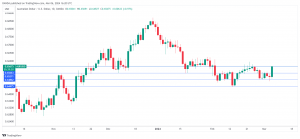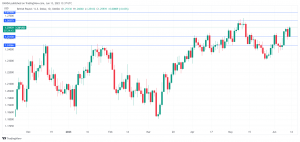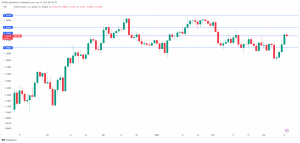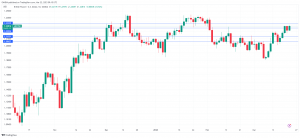US dollar retreats as Wall Street rises
The US dollar fell heavily on Friday, versus the developed market space, as Wall Street’s impressive rally spilt over into a broader sentiment rally in other asset classes. That saw the dollar index make a long-overdue correction lower. The dollar index fell 0.60% to 107.98 on Friday, easing another 0.17% lower to 107.80 in Asia as US dollar weakness continued. Resistance is at 109,30, the overnight highs, and then 110.00. Support is at 107.50 and then the 1.0585 breakout point, followed by 1.0500. The relative strength index indicator (RSI) has moved out of the overbought territory, but the technicals suggest the US dollar correction could continue through the week.
EUR/USD rallied by 0.67% to 1.0088 on Friday, rising another 0.17% to 1.0115 in Asia. The technical picture suggests a correction back towards 1.0200 is possible, but only a sustained break above 1.0360 would suggest a longer-term low is in place. EUR/USD has support at 1.0000 and 0.9900/25. The single currency faces serious event risk in the latter half of the week, firstly from the ECB policy decision, and secondly, from Russian natural gas flows which are due to resume after pipeline maintenance.
GBP/USD followed the euro overnight, finishing 0.37% higher at 1.1870, rising 0.23% to 1.1895 in Asia. It has support at 1.1800 and 1.1760, with resistance at 1.1965, followed by 1.2060 and 1.2200. A rise above 1.2060 suggests a larger rally to the 1.2400 regions, but it would take a sustained break of 1.2400 to call for a longer-term low by sterling.
USD/JPY fell on Friday by 0.38% at 138.50, easing another 0.15% to 138.30 in Asia. Thursday’s high around 139.40 is initial resistance, followed by 140.00. Support is at 137.40 and 136.00. Given the sentiment in the market this week, a fall in US yields this week could finally translate to a meaningful downside correction by USD/JPY, which is a crowded trade.
AUD/USD and NZD/USD rallied on Friday as investor sentiment ended the week on a high note. NZD/USD leapt higher on higher-than-expected inflation data today, but those early gains have since been eroded. AUD/USD and NZD/USD are both 0.25% higher at 0.6810 and 0.6175. Both currencies are showing falling wedge formations. A sustained break above 0.6850 or 0.6200 signals more gains ahead this week by the antipodeans.
Asian currencies had another noisy session on Friday, but as the dust settled, were mostly unchanged versus the US dollar. The price action merely reversed their intraday losses from earlier in the session. The positive news headlines from China over the weekend on stimulus to support the property sector has allowed Asian currencies to book modest gains in Asia. However, despite a slew of recent policy tightenings in the region, fears of a widening interest rate differential with the US continue to cap gains by Asian currencies. That suggests markets will continue to call Asian central bank’s bluffs, the first being Indonesia on Thursday. Notably, the Philippine peso and Indian rupee continue to remain under pressure, USD/PHP rising 0.15% today to 29.913, with USD/INR rising 0.10% to 79.770. Across the rest of the region USD/Asia has fallen modestly by between 0.10% and 0.20%.
This article is for general information purposes only. It is not investment advice or a solution to buy or sell securities. Opinions are the authors; not necessarily that of OANDA Corporation or any of its affiliates, subsidiaries, officers or directors. Leveraged trading is high risk and not suitable for all. You could lose all of your deposited funds.
- AUD/USD
- Bitcoin
- blockchain
- blockchain compliance
- blockchain conference
- Central Banks
- China
- coinbase
- coingenius
- Consensus
- crypto conference
- crypto mining
- cryptocurrency
- decentralized
- DeFi
- Digital Assets
- dollar index
- ECB rate decision
- ethereum
- EUR/USD
- FX
- GBP/USD
- machine learning
- MarketPulse
- Newsfeed
- non fungible token
- NZD/USD
- plato
- plato ai
- Plato Data Intelligence
- Platoblockchain
- PlatoData
- platogaming
- Polygon
- proof of stake
- Russian gas
- Technical Analysis
- Treasuries
- US equity markets
- US yields
- usd/inr
- USD/JPY
- USD/PHP
- W3
- zephyrnet












